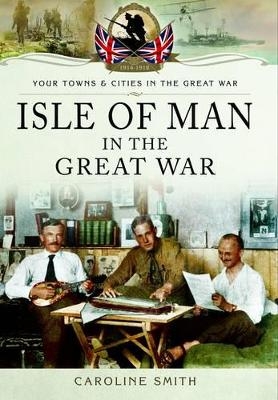
Isle of Man in the Great War
Seiten
2015
Pen & Sword Military (Verlag)
978-1-78383-122-7 (ISBN)
Pen & Sword Military (Verlag)
978-1-78383-122-7 (ISBN)
- Keine Verlagsinformationen verfügbar
- Artikel merken
A concise history of the people of the Isle of Man during the Great War. An insight into the social and political divisions of the period and the lasting changes that came about. Personal accounts of events from letters and newspapers.
In August 1914, the Isle of Man was in the middle of a very successful summer season. The tourist industry was crucial to the island, but suddenly holiday-makers left and the Steam Packet vessels that normally brought them were requisitioned. The future was uncertain for those who relied on the season and their pleas for assistance were ignored. For some, the cost of living became impossibly high and without the welfare measures that had been brought about in Britain, many faced destitution. Others however, particularly farmers and those involved with the internment camps, would find war very profitable. The divisions between rich and poor grew creating much social disaffection and a bitter battle for reform was fought. As arguments raged over conscription, taxation, the economy and the housing of enemy aliens, the personalities of the period came to prominence. The unprecedented scenes of direct action and several dramatic court cases are brought to life in this account of how the island began its path to progress. The Isle of Man played an important role in World War One, supplying troops and vessels and running special camps for the internment of enemy.
8,261 men enlisted in the armed forces, which was 82.3% of the Isle of Man's male population of military age. Of these, 1,165 gave their lives and 987 were wounded. The experience of war significantly impacted on the Island, from the initial enthusiasm for sorting out the German Kaiser in time for Christmas 1914, to the gradual realization of the enormity of human sacrifice the families of the Isle were committed to as the war stretched out over the next four years. The Great War affected everyone. At home there were wounded soldiers in military hospitals, refugees from Belgium and later on German prisoners of war. There were food and fuel shortages and disruption to schooling. The role of women changed dramatically and they undertook a variety of work undreamed of in peacetime. Extracts from contemporary letters reveal their heroism and give insights into what it was like under battle conditions.
In August 1914, the Isle of Man was in the middle of a very successful summer season. The tourist industry was crucial to the island, but suddenly holiday-makers left and the Steam Packet vessels that normally brought them were requisitioned. The future was uncertain for those who relied on the season and their pleas for assistance were ignored. For some, the cost of living became impossibly high and without the welfare measures that had been brought about in Britain, many faced destitution. Others however, particularly farmers and those involved with the internment camps, would find war very profitable. The divisions between rich and poor grew creating much social disaffection and a bitter battle for reform was fought. As arguments raged over conscription, taxation, the economy and the housing of enemy aliens, the personalities of the period came to prominence. The unprecedented scenes of direct action and several dramatic court cases are brought to life in this account of how the island began its path to progress. The Isle of Man played an important role in World War One, supplying troops and vessels and running special camps for the internment of enemy.
8,261 men enlisted in the armed forces, which was 82.3% of the Isle of Man's male population of military age. Of these, 1,165 gave their lives and 987 were wounded. The experience of war significantly impacted on the Island, from the initial enthusiasm for sorting out the German Kaiser in time for Christmas 1914, to the gradual realization of the enormity of human sacrifice the families of the Isle were committed to as the war stretched out over the next four years. The Great War affected everyone. At home there were wounded soldiers in military hospitals, refugees from Belgium and later on German prisoners of war. There were food and fuel shortages and disruption to schooling. The role of women changed dramatically and they undertook a variety of work undreamed of in peacetime. Extracts from contemporary letters reveal their heroism and give insights into what it was like under battle conditions.
Caroline Smith was born and educated in Wakefield, West Yorkshire, and has a degree in history from Lancaster University. After taking an accountancy qualification and working mainly in manufacturing, Caroline and her husband relocated to the Isle of Man. Caroline is the author of several articles about the island. She is also involved with the local History in Action group, who aim to tell the stories of the island, including those of the Great War, through drama.
| Erscheint lt. Verlag | 1.3.2015 |
|---|---|
| Zusatzinfo | 100 illustrations |
| Verlagsort | South Yorkshire |
| Sprache | englisch |
| Maße | 156 x 234 mm |
| Themenwelt | Sachbuch/Ratgeber |
| Geschichte ► Allgemeine Geschichte ► Neuzeit (bis 1918) | |
| Geschichte ► Allgemeine Geschichte ► 1918 bis 1945 | |
| Geisteswissenschaften ► Geschichte ► Regional- / Ländergeschichte | |
| ISBN-10 | 1-78383-122-7 / 1783831227 |
| ISBN-13 | 978-1-78383-122-7 / 9781783831227 |
| Zustand | Neuware |
| Haben Sie eine Frage zum Produkt? |
Mehr entdecken
aus dem Bereich
aus dem Bereich
Europa 1848/49 und der Kampf für eine neue Welt
Buch | Hardcover (2023)
DVA (Verlag)
48,00 €
Giordano Bruno - ein ketzerisches Leben
Buch | Hardcover (2024)
C.H.Beck (Verlag)
29,90 €


